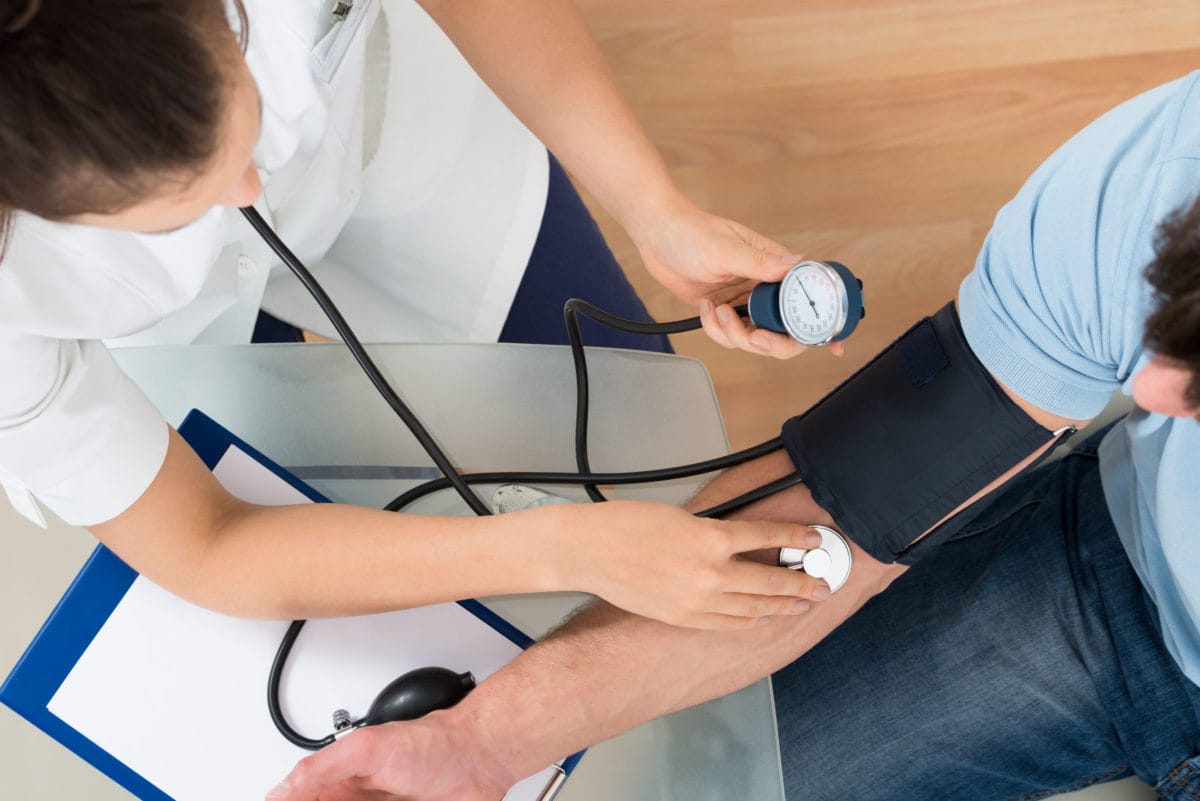High blood pressure, or hypertension, occurs due to a significant violation of the vascular wall state when the blood vessels’ diameter changes significantly. The passage of the blood flow becomes difficult. The heart needs to contract harder than usual to move the blood along the vascular bed, leading to serious diseases. In this article, we will give you a complete guide about high blood pressure causes.
People with diabetes and high blood pressure are twice as likely to have heart disease as hypertensive but do not have diabetes. Research also shows that high blood pressure increases kidney disease risk, diabetic eye disease, and stroke.
The reasons for the increase in pressure
Table of Contents
Increased blood pressure in a healthy person is a natural response to stress and exercise. They say about the presence of a problem if, after three control measurements, blood pressure exceeds 140/90. Then the diagnosis is likely – hypertension.
For most people, the disease does not give symptoms, hence its second name: the silent or invisible killer. The first symptoms appear when the body ceases to withstand such a load independently, and critical changes occur in the vessels. The first signs are:
- Increased anxiety.
- Heart palpitations.
- Redness of the face.
- Shortness of breath and dizziness.
- Headache and pressure in the temples.
- Chest pain in the region of the heart.
- Decreased visual acuity.
Fatigue, similar to the onset of a cold, is also a characteristic symptom. It is accompanied by eye redness, drowsiness, and irritability. If the pressure approaches the extreme mark, this is a reason to consult a doctor.
High blood pressure is divided into two categories, primary (essential) hypertension and symptomatic. The first is a chronic process characterized by constantly high blood pressure. The second is a symptom of other diseases of the human body.
high blood pressure causes primary hypertension
It is difficult to name the exact reason for the development of chronic hypertension. The development of the disease occurs due to disturbances in the functioning of blood pressure regulation mechanisms, which arise for various reasons. More fluid accumulates in the body. The kidneys do not respond to accidental increases in pressure during exercise and stress. Increased activity of the nervous system can lead to violations of blood pressure. Changes in her sensitivity can be due to genetics or environmental factors – stress, chronic fatigue, or pain. With an increase in the activity of the central nervous system, the load on the heart increases.
The cause of high blood pressure can be disorders of blood circulation in tissues – edema due to problems with metabolism, epithelial dysfunction. In older people, blood pressure rises with age. Doctors do not dispute the heredity factor for essential hypertension. So the probability of her inheritance is 30%.
Risk factors for primary arterial hypertension include:
- An excess of saturated fatty acids in the menu, in particular cholesterol.
- The high salt content in foods such as pickles and processed foods.
- A sedentary lifestyle and excess body weight.
- Smoking and alcohol.
- Tension, stress, nervous breakdowns.
Excess cholesterol is deposited on blood vessels’ walls, narrowing their lumen and interfering with blood flow. The structure of the arteries also changes due to an excess of salt. Excessive use of it makes the vessels fragile and impairs their elasticity.
Weight, as one of the reasons for the development of hypertension, is considered in the context of BMI – overweight. If this indicator is significantly exceeded, measures must be taken to reduce the risk of complications. The risk of developing arterial hypertension with overweight increases by 2-6 times, especially with the upper type of obesity, when the waist circumference increases.
high blood pressure causes secondary
A characteristic difference between the disease and primary hypertension is the absence of a smooth increase in symptoms, ranging from mild irritability to hypertensive crisis. Moreover, secondary hypertension is more common in young people. Simultaneously, there is acute symptomatology and a lack of response to chronic hypertension’s standard treatment.
In this case, you need to see a doctor. There are five main categories into which the high blood pressure causes of secondary hypertension are divided:
- Renal
- Endocrine
- Neurogenic
- Cardiovascular
- Medicinal
An increase in blood pressure occurs with polycystic kidney disease, with a large renal cyst, as well as nephritis and nephropathies. With the endocrine type, an increase in pressure can occur due to diseases of the adrenal glands of tumors, disruption of the adrenal cortex – increased production of hormones. Insufficient or excessive production of thyroid hormones can also cause hypertension. Changes in the parathyroid glands’ functioning, such as tumors that disrupt the endocrine system’s functioning, and arterial hypertension as a symptom.
The neurogenic category includes an increase in intracranial pressure due to a tumor, trauma, stroke. The cause of high blood pressure can be bronchial asthma, pneumosclerosis, or pulmonary emphysema – diseases that contribute to the retention of carbon dioxide. Cardiovascular problems such as aortic valve insufficiency are also the cause of secondary hypertension. The symptom also manifests itself in atherosclerosis. High blood pressure is one of the side effects of some medications.
Without specialists’ intervention, primary hypertension gradually progresses and leads to heart failure, heart attacks, and strokes. And the secondary is a symptom of critical changes in the patient’s body. Therefore, it is so important to carry out timely diagnosis and treatment. Delaying a visit to the doctor is dangerous to health.
Also Read: Symptoms of MS in Women
6 reasons for high blood pressure causes
Arterial hypertension for a long time proceeds without obvious manifestations. However, soon enough, it can lead to the occurrence of acute disorders of cerebral circulation in the form of TIA (the so-called transient ischemic attack, or, in other words, all manifestations of a stroke, but within a day), strokes, as well as hypertrophy of the heart walls and/or an increase in cavities hearts.
Also, arterial hypertension is a risk factor for the formation of atherosclerotic plaques in the vessels and the occurrence of myocardial infarction. The relationship between blood pressure and the risk of cardiovascular disease is linear. The higher the blood pressure, the greater the likelihood of myocardial infarction, stroke, heart failure, and kidney damage. The prevalence of arterial hypertension AH in the Russian Federation is 39.3% among men and 41.1% among women, while BP is properly controlled only in 17.5% of women and 5.7% of men. Systolic blood pressure steadily increases with age, while diastolic blood pressure rises to 60 years in men and 70 years in women, after which there is a tendency to decrease it.
Also Read: Transcribe Audio To Text
1. Cause of pressure increase: High Blood Pressure Causes
Renal arterial hypertension.
They occur with congenital or acquired kidney diseases (developmental anomalies, glomerulonephritis, pyelonephritis, etc.). Any cause that high blood pressure causes disturbances in intrarenal blood flow, such as narrowing the renal arteries, kidney disease leads to the kidneys’ malnutrition. In response, they release a large amount of a substance called renin into the bloodstream.
As a result of the release of renin, the following processes occur:
- Small vessel spasm and gradual thickening of the vessel wall
- Retention of excess fluid in the bloodstream
- All this leads to an increase in the heat load, increasing its work and, accordingly, to an increase in blood pressure.
NATURAL MECHANISM OF REDUCING HELL
The kidney tissue secretes special substances that can have a direct vasodilator effect. As a result, the initial increase in blood pressure is caused by a deterioration in the blood supply to the kidneys, and its normalization replaces the release of renin.
Also Read: Where Is The Liver Located
2. The reason for the increase in pressure
Arterial hypertension of endocrine origin
Revealed mainly in the following diseases:
- pheochromocytoma
- primary aldosteronism (Connes syndrome)
- Itsenko-Cushing’s disease and syndrome
- thyrotoxicosis
This is the name of a tumor of the adrenal medulla, which produces significant adrenaline and similar substances. This leads to an increase in blood pressure. The concentration of adrenaline in patients with pheochromocytoma in the blood and urine increase 10-100 times. With this disease, there will be more often sharp rises in blood pressure with the development of hypertensive crises.
Primary aldosteronism (Connes syndrome).
With this disease, there will be an overgrowth of certain areas of the adrenal glands (these are glands located on the kidneys) and an increase in the hormone aldosterone’s secretion. This leads to water retention in the body and an increase in circulating blood volume, and, consequently, to increased blood pressure and arterial hypertension.
Itsenko-Cushing’s disease and syndrome.
They lead to an increase in the level of hormones – glucocorticoids in the blood. These hormones affect the heart and blood vessels, increasing their tone and intensity of the heart. The result of these hemodynamic effects is an increase in blood pressure.
Hyperthyroidism.
It occurs with an increased function of the thyroid gland, as a result of which the level of substances called thyroxine (T4) and triiodothyronine (T3) in the blood rises. These hormones cause vasospasm and heart palpitations.
Also Read: How To Get Rid Of Dandruff
3. The reason for the increase in pressure: High Blood Pressure Causes
Arterial hypertension resulting from structural changes in the heart or large vessels. Systolic hypertension develops more often with an increase in pulse pressure (this is the difference between systolic and diastolic pressure, that is, the pressure will be, for example, 200/80). Coarctation of the aorta is a congenital narrowing of a certain area of the largest vessel extending from the heart, the thoracic aorta, which creates two modes of blood circulation: high pressure in the upper half of the body and decreased pressure in the lower half.
It occurs in men 4 times more often than in women. Nonspecific aortoarteritis is a disease in which the body itself damages its organs and systems, leading to an increase in the rigidity of the aorta and large arteries and their narrowing and the impossibility of stretching them.
Also Read: House Party App Hacking
4.The reason for the increase in pressure
Hypertension is associated with damage to the nervous system.
They develop with tumors, bruises and concussions of the brain, meningitis, meningoencephalitis, deterioration of the blood supply to the brain, caused by narrowing of the lumen of the cervical (carotid, vertebral) arteries due to the formation of plaques in their lumen or their compression due to osteochondrosis of the cervicothoracic spine. In this case, the pressure rises due to a change in the tone of the brain’s higher nerve centers, which are responsible for its regulation.
Also Read: How old is Chuck Norris.
5.The reason for the increase in pressure
Medication-related hypertension. Many medicines have side effects, such as increased blood pressure. First of all, attention should be paid to various hormonal drugs, such as anabolic or glucocorticoid drugs, widely used in medicine.
Also Read: Most Expensive Pokemon Card
6.The reason for the increase in pressure
Hypertension or primary arterial hypertension
this is a persistent increase in blood pressure, not associated with organic damage to organs and systems. The common name for primary arterial hypertension or hypertension is the term “essential hypertension,” which means its origin is unclear. Hypertension accounts for 90-95% of the total number of arterial hypertension.
The cause of hypertension. Prolonged psycho-emotional overstrain is of paramount importance in the onset of hypertension. The frequent cases of primary hypertension evidence this in people who survived the Leningrad blockade and people of “stressful” professions. Negative emotions play a special role.
Unlike representatives of the animal world, a modern civilized person often does not have the opportunity to “extinguish” his emotional arousal by motor activity. This contributes to the long-term preservation in the cerebral cortex of the focus of stagnant excitement and the development of arterial hypertension. On this basis, hypertension was called the disease of unreacted emotions.
Hypertension is “a disease of the fall of a person’s life, which deprives him of the opportunity to live until winter.” This is what Academician A.A. Bogomolets, thus emphasizing the predisposing role of age in its origin. However, primary hypertension often develops at a young age. It is important to note that before the age of 40, men get sick more often than women, and after 40 years, the ratio becomes the opposite. An important role in the etiology of primary hypertension is attributed to heredity.
It is believed that long-term consumption of more than 5 g of salt per day contributes to hypertension development only in persons with a hereditary predisposition. So, excess salt intake is more likely a risk factor for developing HD.











